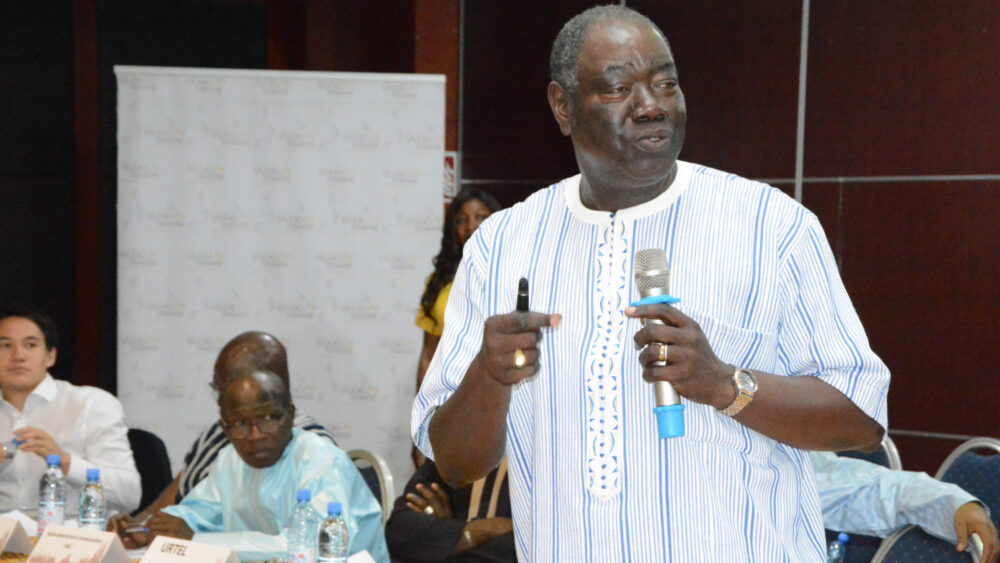Martin Faye a quitté en mars ses fonctions de Représentant national de la Fondation Hirondelle au Mali. Pas tout à fait l’heure de la retraire pour autant, il prend un nouveau poste de chargé de mission et s’occupera du développement de nouveaux projets de formation. Son successeur au poste de Représentant est Thierry Perret, ancien journaliste de RFI, qui reprend donc la supervision du projet Studio Tamani. L’occasion de faire le point avec Martin Faye sur l’évolution de Studio Tamani et de partager son analyse de l’évolution des paysages médiatiques africains.
Vous avez dirigé Studio Tamani pendant 5 ans. Comment a évolué l’équipe de Studio Tamani au fil de ces années, quels progrès ont été accomplis et quels sont les défis qui restent à relever ?
Martin Faye : Comme partout dans ses projets, l’action de la Fondation Hirondelle sur le terrain repose sur les ressources humaines locales. D’abord un recrutement de qualité, ensuite une formation continue, un coaching quotidien, bâtir progressivement un vrai esprit d’équipe et inculquer à chaque membre du staff, « un esprit hirondellien » avec les valeurs de la FH, sa Charte, sa ligne éditoriale, son approche…Pendant 3 ans, la rédaction a été accompagné par un Chef Média expatrié. Depuis plus de 2 ans maintenant, elle est dirigée par une rédaction en chef malienne. La progression de l’Équipe fait plaisir à voir. Elle fait preuve d’engagement et elle demeure étonnamment motivée. Je dis toujours aux visiteurs de marque qui passent à Tamani que cette équipe dont la moyenne d’âge est 25 ans, est à l’image de ce que le Mali ne doit jamais cesser d’être : multiethnique, multiculturelle, multiconfessionnelle, l’unité dans la diversité.
Le défi principal de Studio Tamani, c’est la pérennisation du Projet. Inscrire Studio Tamani dans la durée. Passer de l’état de projet à impact rapide à un projet durable et pérenne. Le Mali d’aujourd’hui et demain a besoin de Studio Tamani. La Fondation Hirondelle y travaille, en concertation avec ses partenaires maliens et ceux à l’international.
Comment mesurez-vous l’impact de Studio Tamani au Mali ? Quel rôle peut jouer un programme d’information tel que celui-ci dans un pays confronté à de graves crises comme le Mali ?
Dans une étude d’audience réalisée en novembre et décembre 2020, 88% des auditeurs.trices interrogé.es trouvent que les programmes radiophoniques de Studio Tamani sont «utiles » ou « indispensables ». Les informations diffusées par Studio Tamani sont jugées fiables et impartiales par 8 auditeurs.trices sur 10. L’impartialité dans le traitement est unanimement reconnue. Voilà quelques enseignements de la dernière mesure d’impact.
Dans un pays en crise, l’information est aussi une denrée de première nécessité. Les populations ont un besoin vital d’une information fiable et crédible. Elle leur permet de se prémunir contre les risques qui les menacent. Studio Tamani joue pleinement ce rôle. Mieux encore, Studio Tamani est aussi un espace de dialogue inclusif où s’expriment tous les points de vue. Des groupes et des acteurs antagonistes apprennent à mieux se connaitre et à dialoguer à travers une émission quotidienne de débat « Le Grand Dialogue ». Studio Tamani est aujourd’hui un trait-d’ union entre les maliens, un intermédiaire qui favorise la communication interactive entre les citoyens, leurs représentants, les gouvernants et les décideurs internationaux.
Vous avez consacré votre vie professionnelle au journalisme, à son enseignement, et au soutien aux médias d’information en Afrique. Quelles leçons tirez-vous de cette expérience, sur la fonction sociale du journalisme aujourd’hui à travers le continent, et sur le rôle des médias ?
J’ai démarré ma carrière de journaliste à Radio-Sénégal dans un contexte de monopole détenu par la radio nationale. Ensuite j’ai vu éclore les premières stations privées et donc l’émergence du pluralisme radiophonique, dans mon pays le Sénégal comme dans beaucoup d’autres pays. J’ai pu mesurer, au travers de multiples situations, à quel point les médias sont tels la langue d’Esope : capables du meilleur comme du pire. Je reste préoccupé par le manque de formation de base solide de nombreux journalistes africains, avec les dérapages, les maladresses, l’ignorance des règles élémentaires déontologiques qui régissent la profession. Le pluralisme des médias n’a malheureusement pas pris en compte les immenses tâches de formation pour accompagner les nombreux nouveaux arrivants dans le journalisme.
Quels sont les principaux défis auxquels sont confrontés les journalistes et les médias d’information aujourd’hui en Afrique ? Quels sont leurs atouts pour y faire face, et de quoi ont-ils le plus besoin ?
Je déplore, comme tant d’autres confrères africains, une forme de journalisme qui dénature complètement la profession. Je suis un opposant farouche au « journalisme alimentaire » et au « journalisme embarqué ». Les conditions d’exercice de la profession sont déplorables et expliquent les dérives constatées. De bas salaires versés aux agents des rédactions entraînent des pratiques que la morale et l’éthique du journalisme condamne. Des médias existent où le principe en guise de salaire, c’est « payez-vous sur la bête ». En situation de reportage, le transport est assuré par celui qui organise l’événement. Comment dans ces conditions, peux—t-on promouvoir et exercer un journalisme rigoureux et responsable, basé sur la vérification de l’information, la multiplicité des sources, une distinction stricte entre les faits et les commentaires, garantir l’impartialité et la crédibilité des informations…
Toutes les associations de journalistes, au Mali comme ailleurs, se sont engagées dans une revalorisation de la profession, séparer le bon grain de l’ivraie, délivrer la carte professionnelle seulement sur la base de références solides et avérées, négocier une convention collective qui garantit un salaire permettant aux professionnels de l’information de vivre dignement et d’éviter les pratiques contraires aux règles déontologiques. De bien vastes chantiers !

